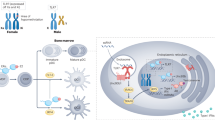Abstract
The androgen-insensitivity syndrome (AIS) and Rokitansky syndrome (RS) are clinically similar except for H-Y antigen, chromosomal sex, gonadal sex, and the cyclicity of sex hormonal functioning. Nine AIS women and nine RS women could not be distinguished systematically on any of the following variables: romantic and genitoerotic imagery/ideation; sensory channels of erotic arousal; gender orientation; satisfaction with feminine status; self-rating of sexual frequency and interest; masturbation experience; orgasm experience; attitude toward marriage; and attitude toward infant and child care. These findings indicate that neither H-Y antigen status, chromosomal sex, nor hormonal cyclicity directly determines the differentiation of gender-identity/role (G-I/R) as male, female, or ambiguous. By implication, these findings are relevant to heterosexual/homosexual theory.
Similar content being viewed by others
References
Amrhein, J. A., Meyer, W. J., III, Jones, H. W., Jr., and Migeon, C. J. (1976). Androgen insensitivity in man: Evidence for genetic heterogeneity.Proc. Natl. Acad. Sci. (U.S.) 73: 891–894.
Amrhein, J. A., Meyer, W. J., III, Keenan, B. S., and Migeon, C. J. (1977). Androgen receptor studies in androgen insensitivity syndrome of man. In Lee, P. A., Plotnick, L. P., Korwarski, A. A., and Migeon, C. J. (eds.),Congenital Adrenal Hyperplasia. University Park Press, Baltimore, MD.
Aona, T., Mujake, A., Kinugasa, T., Kurachi, K., and Matsumoto, K. (1978). Absence of positive feedback effect of estrogen on LH release in patients with testicular feminization syndromes.Acta Endocrinol. 87: 259–267.
Griffin, J. E., Edwards, C., Madden, J. D., Harrod, M. J., and Wilson, J. D. (1976). Congenital absence of the vagina.Ann. Intern. Med. 85: 224–236.
Koo, G. C., Wachtel, S. S., Saenger, P., New, M.I., Dorsik, H., Amarose, A. P., Dorus, E., and Ventruto, V. (1977). H-Y antigen: Expression in human subjects with the testicular feminizing syndrome.Science 196: 655–656.
Migeon, C. J., Brown, T. R., and Fichman, K. R. (1981). Androgen insensitivity syndrome.Ped. Adol. Endocrinol. 8: 171–202.
Money, J. (1986). Longitudinal studies in clinical psychoendocrinology: Methodology.J. Dev. Behav. Pediatr. 7: 31–34.
Money, J., and Ehrhardt, A. A. (1972).Man and Woman, Boy and Girl: The Differentiation and Dimorphism of Gender Identity from Conception to Maturity. Johns Hopkins University Press, Baltimore, MD.
Van Look, P. F. A., Hunter, W. M., Corker, C. S., and Baird, D. T. (1977). Failure of positive feedback in normal men and subjects with testicular feminization.Clin. Endocrinol. 7: 353–366.
Author information
Authors and Affiliations
Additional information
Supported by U.S. Public Health Service Grant #HD00325 and Grant #83086900, William T. Grant Foundation.
Rights and permissions
About this article
Cite this article
Lewis, V.G., Money, J. Sexological theory, H-Y antigen, chromosomes, gonads, and cyclicity: Two syndromes compared. Arch Sex Behav 15, 467–474 (1986). https://doi.org/10.1007/BF01542311
Issue Date:
DOI: https://doi.org/10.1007/BF01542311




